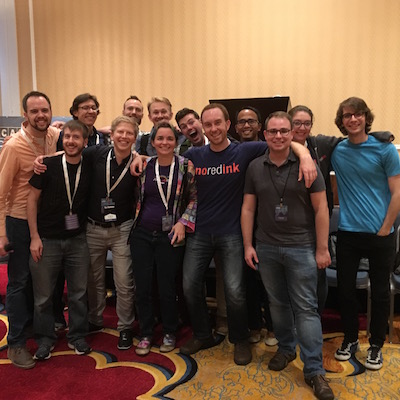Speakers
We have a full lineup of great speakers for elm-conf. We have a wide range of topics, from making music to diving into how Elm helps ADHD to using templates for easier maintenance. It's going to be quite a day!
We have a full lineup of great speakers for elm-conf. We have a wide range of topics, from making music to diving into how Elm helps ADHD to using templates for easier maintenance. It's going to be quite a day!

Evan created Elm, a functional language for web programming. He is an open source engineer at NoRedInk, where all front-end code is written in Elm these days. He continues to develop the language, tools, and libraries full time.

Have you come into grips with Elm as a language and prolific enough to start using it in a real project? Awesome! Did you already have an idea of how you would structure your application, handle authentication and maybe show toast-like pop up messages in the UI? If not, this talk is for you.
Many people know how to create small apps for fun in Elm. Some have crafted larger things but felt they were missing something. Having done two larger customer projects in Elm, I have some solid experience under my belt about building big applications for production. In both projects, the initial folder structure and the initial module architecture became untenable in a few months. This talk is a down-to-earth lessons learned aimed for everyone who has done or is planning on doing production applications using the language. I will introduce strategies to overcome some of the common problems we have as frontend engineers, but also share some war stories of times when things didn’t quite go as planned.
Ossi is building apps for browsers to run and users to enjoy at Futurice. He likes to constantly challenge his views on user interface programming, and lately has gravitated towards functional programming and strong typing with Elm. Ossi has started two separate customer projects (both of them ongoing) using the language, making Futurice one of the first commercial users of Elm. He is also the main person behind Elm Native UI, the open source project trying to make building mobile apps with React Native possible in Elm, and Keyboard.Extra.

I have ADHD and struggle to stay focused on things. This has actually been helpful in learning JS since things change as quickly as my attention does, but it makes it hard to finish things. Elm pushes out distractions so I can focus, and at last the first side-project I’ve ever completed is in Elm!
I’ve lived with ADHD my whole life. There are certainly worse things to live with, but our world is tailored to people who can concentrate – tasks and deadlines drive our working society. I’ve spent most of my illustrious career working with JS, where things change just as quickly as my attention, and it’s been hard to feel a sense of grounding or belonging. Then I found Elm. Even though Elm wasn’t designed for people with ADHD explicitly, it is the best language for those who do to build applications. With Elm, the distractions fall away and I am able to channel more of the craziness that I experience in my head into useful work. In this talk I will share my experiences as such a person with all of you. I hope you’ll come away understanding that using Elm isn’t just good for applications, it’s good for people. If we can keep the developer’s personal experiences in mind when building tools and libraries we will have a more inclusive and accessible community!
Luke Westby is a cofounder and partner at HumbleSpark in Chicago, IL, USA. He is an active member of the Elm community, helping to maintaining several open source packages including elm-http-builder and elm-lang/core. He loves contributing to the Elm community by speaking about the language, answering questions in the Elm Slack, writing blog posts, and organizing the Chicago Elm Meetup. When he is not thinking about code he likes to play the guitar, speed-run Metroid Fusion, and watch far too much TV with his fiancée.

Elegant data structures are different across programming languages, and creating them should be approached differently. Leverage Elm’s union types to build simple and readable structures, beginning with binary trees.
Writing a binary tree might be a familiar task in JavaScript or Ruby, and it might seem like a very similar problem in Elm. While it’s possible to create data structures in Elm that are very similar to ones written in languages that aren’t strictly functional and that don’t have types, there are better approaches. This talk will explore a few different implementations and recommendations, and assumes an audience without extensive academic ML-family language experience.
As a software engineer at NoRedInk, Tessa reads, writes, and extends a lot of Elm code. Before joining NoRedInk, Tessa spent her time thinking about curricula, learning, and engagement in the context of teaching web development. She holds a BA in Mathematics from New York University, where she also minored in History and in Middle Eastern Studies.

Games and rich applications present a compelling use-case for Elm, but managing dynamic animations can quickly become complicated. Here’s how to succinctly express animation pipelines using the elm-style-animation library and how to architect your animation code in a readable, extensible manner.
In this talk we’ll cover…
If you’re here, you probably already know that Elm is a solid base for building complex applications. You’ll come away from this talk with the tools to make those applications gorgeous as well.
Matthew Griffith is a developer with a passion for intuitive interfaces. Then again, he’s also a data scientist who’s worked in cheminformatics for the past eight years and loves a good dataset. More recently he developed the elm-style-animation library in his pursuit of creating maintainable, beautiful apps in Elm.
Matthew is a developer in residence at Cornell Tech in Manhattan.

While Elm pretty much solves the tool and framework fatigue when starting a new front-end project, we still have the same issue for the back-end. Using Horizon in your Elm app can help alleviate the pain by reducing the amount of work you have to do in the back-end, so you can write more Elm code.
When starting a new project in JavaScript, you’re most likely going to spend a lot of time choosing the tools and frameworks to use, and then spend more time configuring them. Elm pretty much solves this problem by providing all the tooling you need out of the box, and by The Elm Community’s preference to have one way to do things, so you don’t have choose between 100 different packages just to solve 1 problem.
But, how about the back-end? You still have to choose all the stacks; from database, web server, programming language, and the framework. At least, until we have server side Elm, we still have the same problem here.
Wouldn’t it be great if you don’t have to worry about the back-end, and can just focus on writing Elm code and be happy? We can do that with Horizon. Horizon is an open source server designed for building real time application without writing any back-end code. With Horizon, all you need to do is to run the Horizon server, start writing Elm code, and be happy and productive.
Abadi is a senior developer at Engage Software, a St. Louis based software company. He has been writing Elm in production since March 2016. He’s the author of Elm Credit Card and Elm Input Extra. Outside of work, he spends time with his wife and son, and works on making his house smarter so he can spend more time with his family and less on doing chores.

Dive into Elm’s random generators on a quest to build a historically accurate Roman random name generator for the goddess Juno, based on a series of dependent and independent constraints.
You are an ancient software engineer. Juno, the Roman goddess of marriage and fertility, surprises you by walking into your office and offering you an assignment. Overseeing the birth and naming of all Roman children is becoming a large and monotonous task. She is looking to modernize and automate. Will you build her a piece of software to randomly generate valid information for a Roman child?
Join us on the quest to complete this project using Elm’s random generators. Along the way, we will see how to create complex generators out of simple ones, how to handle dependent and independent constraints, and how to work with percentages and Maybe. You will leave with a firm grasp of how Elm handles randomness in a functional manner and the confidence to implement your own generators.
Joël is a software developer at thoughtbot. He is passionate about best practices and building excellent software. Although he got his start with dynamically typed imperative languages, he has recently become fascinated with the statically typed functional world and Elm in particular. Outside of programming, Joël loves to study history. He often combines these two interests together to play with historically-themed software side projects.

The Elm Architecture works great for apps, but how about for building a game framework? This talk looks at using the strengths of Elm to build the open source “Elm Narrative Engine,” including an example interactive story and the challenges and solutions faced in using Elm to make a framework.
As a programmer by profession and passion, but with a background and schooling in film production and screenwriting, I have forever been drawn to playing and making games with strong narrative components.
I have played, studied and written screenplays, classic text adventures, visual novels, point-and-click adventures, and other storytelling game mediums and tools, comparing and contrasting the different types of stories each affords.
As a self-described “Ambassador of Elm,” I decided to use the strengths of Elm to build a storytelling game framework called the “Elm Narrative Engine” for telling the types of interactive stories I want to tell based on all of my research in this area. The games it makes would be less about modeling spacial navigation and branching narratives over time, and more about modeling a story that unfolds like a puzzle, like a cross between a traditional novel and a point-and-click adventure. The design goals include a clean and simple way to author stories as a developer, and a simple interaction style for players, keeping the focus squarely on the text-based narrative.
This talk looks briefly at some of existing options in this area, such as Inform 7 for writing text adventures, RenPy for making visual novels, and Twine for “non-linear hypertext narratives,” comparing and contrasting their approaches to the Elm Narrative Engine.
After a demo of a fully-featured story written on the Elm Narrative Engine, I will dive into the code and the technical considerations and challenges faced in approaching building the engine with Elm. I will give a lot of attention to the differences of building a framework in Elm, as opposed to an app or library and the challenges this brings, including these topics:
By the end of the talk, the audience should have a good appreciation for the technical and design decisions in interactive storytelling, and a concrete grasp on designing a framework in Elm and how to define the boundaries between client and framework code. As the engine is open source, I encourage pull requests, and my hope is that some of the members of the audience will create their own narrative stories on the Elm Narrative Engine for myself an the rest of the community to play!
I’ve been a professional entertainer and a professional programmer. I’ve written screenplays and I’ve written mobile apps. I’ve been a director of photography and a technical lead. I’ve started more than one juggling club and more than one hack night meetup. I’ve lived in multiple places in the US and multiple places in Europe. I love art and I love vim. I preach the power of creativity and the power of functional programming.
I find fulfillment and perfection in living in two worlds, and combining them into one.

I love the explicitness and structure of Elm. I don’t love typing.
A mechanical friend can help with both: smart templates modify code to perform common tasks, and Github PRs keep this safe and editor-independent.
See an Elm project created and grown with strategically placed automation.
I love the explicitness and the consistent structure of Elm code and the Elm Architecture. Sometimes I don’t love the typing involved.
Elm is well-suited to code generation. We like to generate code (like with html2elm) and modify it. The automation doesn’t have to end there!
This session will demonstrate growing an Elm app with the help of a smarter templating engine and Github pull requests. Tasks like “add a new component” or “start using elm-test” or “change a service contract” happen safely and mechanically, outside of your favorite editor.
Keep all the structure, skip some of the tedium. See another reason that Elm can be our most productive language system yet.
Jessica Kerr (better known as Jessitron) works on deployment at Stripe. She writes Ruby, Scala, Go, you name it. She speaks at conferences in the US, Europe, and Australia. She podcasts as a Ruby Rogue, parents two daughters, and writes Elm for fun. Look for her in St. Louis, San Francisco, and wherever functional programming and silliness meet.

This talk combines the power of Elm and Elixir’s Phoenix to turn Twitter into a platform for live crowd-sourced music composition. We’ll cover Elm and Elixir channels, custom DSL parsing in Elm, and driving the Web Audio API through Elm’s native inter-op abstraction: ports.
This talk aims to demonstrate the power of coordinating:
For illustrative purposes we’ll suppose we are a consultancy, and a client has just approached us with the need to turn tweets into music. She has come up with a compact musical notation that will fit a good chunk of music into 140 characters, and she wants us to teach the browser to play the music encoded in that notation. But that’s not all. Her vision includes a client that streams in tweets, parsing them and queueing them up to be played as they happen, ultimately allowing users to listen to a never-ending piece of real-time music, composed by a symphony of twitter users world-wide.
Chief smile officer and executive code whisperer at Kuali, Murphy makes tools to support higher education. He’s an Egghead.io instructor, a full-stack JS dev, and a functional programming padawan. He comes from a background in animation technologies, specializing in rendering and pipeline development. If you look carefully, you might see his name in the credits of a film.

Among the most time-consuming bugs to track down are the ones where we look at our application state and say “this shouldn’t be possible.”
We can use Elm’s compiler to rule out many of these bugs in the first place—but only if we design our Models using the right techniques! This talk explores how.
When I first started using Elm, I wrote my Models roughly the same way I would have in JavaScript. I was happy that I no longer got type mismatches, but I still often found myself debugging how I’d gotten into an application state that I’d thought was impossible. Over time I learned I could rule out many of these bugs with more careful Model design, and my applications got more reliable as a result.
This talk will explore the techniques I’ve learned to do exactly that. We’ll look at how to use union types for more fine-grained control than records, how to rule out the possibility of collections being unexpectedly empty, and how exposing the right things within modules can preserve these guarantees across a large code base.
Come see how we can use Elm’s compiler to take undesirable application states from “ought to be impossible” to “actually impossible!”
Richard is the author of “Elm in Action” from Manning Publications, and the instructor for the Frontend Masters 2-Day Elm Workshop. When he’s not writing about Elm, teaching Elm, speaking about Elm, or co-hosting the San Francisco Elm meetup, he likes to take a break from his job of writing Elm code full-time as an engineer at NoRedInk by kicking back and working on some of his open-source Elm projects.
Some have said he’s “a fan of Elm,” but he’s not sure where they got that wild idea.

Q&A Session with all the elm-conf speakers.